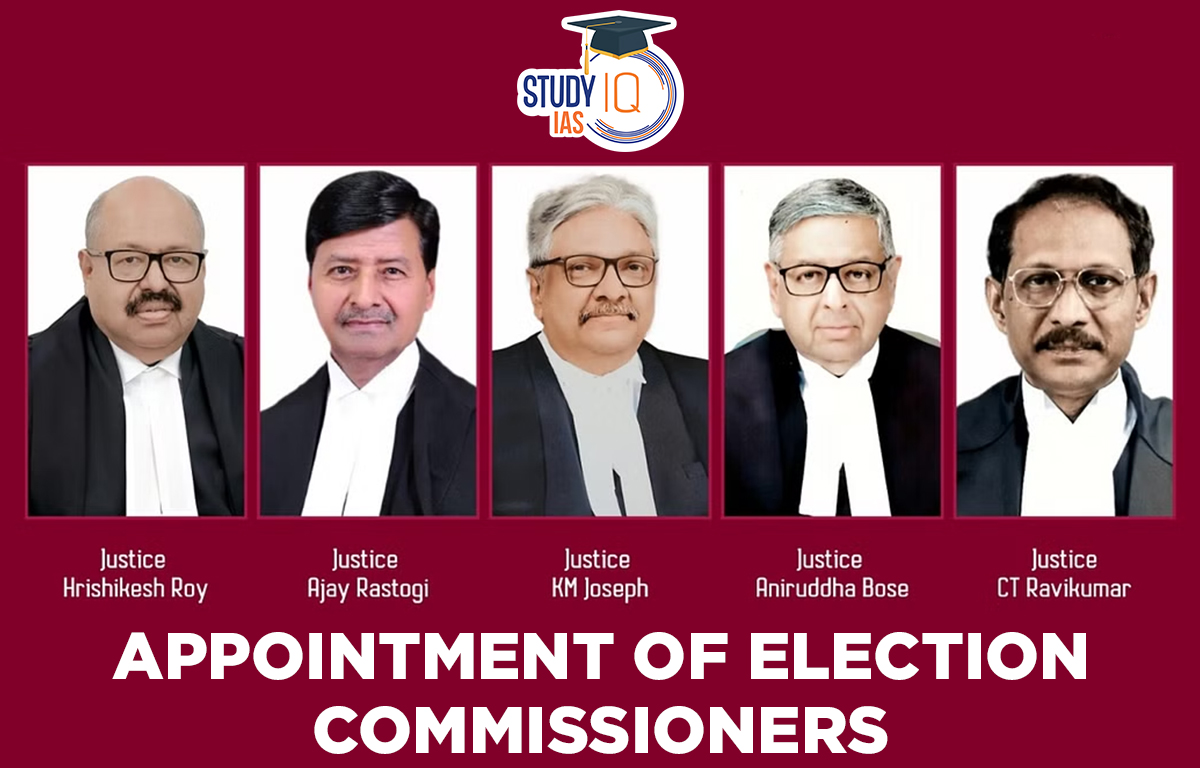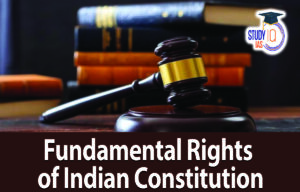Table of Contents
Context: The appointment process of election commissioners (ECs) has been questioned for years, raising serious concerns about the autonomy and impartiality of this vital institution.
Process of Appointment of Election Commissioners (CEC and ECs)
| Aspect | Old Procedure | SC Verdict (Anoop Baranwal vs Union of India) 2023 | New Law |
| Appointment Process | Appointed by the President on the advice of the Union Council of Ministers, usually suggested by the Law Minister and the Prime Minister. | SC ordered that the Chief Election Commissioner (CEC) and Election Commissioners (ECs) shall be appointed on the advice of a committee comprising the Prime Minister, Leader of Opposition in Lok Sabha and Chief Justice of India. | Appointed by the President based on the recommendation of a Selection Committee comprising the Prime Minister, a Union Cabinet Minister, and the Leader of Opposition or leader of the largest opposition party in Lok Sabha. |
| Selection Committee | Not specified. | Prime Minister, Leader of Opposition in Lok Sabha and Chief Justice of India. | Includes the Prime Minister, a Union Cabinet Minister, and the Leader of Opposition/leader of the largest opposition party in Lok Sabha. |
| Search Committee | Not specified. | A Search Committee led by the Cabinet Secretary will recommend a panel of names to the Selection Committee. | |
| Salary and Conditions | Equivalent to a Supreme Court Judge. | Made equivalent to that of the Cabinet Secretary. | |
| Removal Process | The CEC could be removed in a manner similar to a Supreme Court judge. ECs could be removed on the CEC’s recommendation. | Retains the constitutional provision for CEC’s removal like a Supreme Court Judge. ECs can only be removed on the recommendation of the CEC. |
Challenges in the Appointment Process of Election Commissioners
- Lack of Institutional Independence: The executive dominates the selection panel, affecting the neutrality of the ECI.
- The 2023 Act replaced the CJI with a Union Minister, giving the ruling party greater control.
- Violation of Supreme Court’s Spirit: SC’s 2023 ruling recommended a balanced committee (PM, LoP, and CJI) until Parliament passed a law.
- The new law overturned the spirit of the ruling, leading to concerns over executive overreach.
- Delay in Judicial Review: Despite the ADR’s legal challenge, the SC did not grant an interim stay, allowing fresh appointments under the new law.
- The hearing on February 19, 2025, was adjourned without a new date, leaving uncertainty over the legitimacy of the appointments.
- Lack of Transparency: The current selection process lacks public scrutiny and institutional checks.
- No parliamentary oversight or independent review mechanism exists.
- Public Perception and Credibility Issues: Optics matter in democracy—any perception of bias undermines the credibility of elections.
- The ECI’s independence must not only exist but be visible to maintain public trust.
- Global Best Practices Ignored: Other democracies have more transparent, bipartisan, and institutionally balanced selection processes.
- India’s model remains opaque and politically controlled, despite being a leading democracy.
Global Best Practices in EC Appointments
- United States: The President appoints commissioners with the advice and consent of the Senate.
- South Africa: The President appoints ECs based on the recommendation of the National Assembly.
- Brazil: ECs are appointed by the Federal Supreme Court.
- United Kingdom: Appointments are made by the Speaker’s Committee on the Electoral Commission, which has cross-party membership.
- France: ECs are appointed jointly by the President, legislature, and judiciary.
- Nepal: The President appoints ECs based on recommendation by the Constitutional Council, followed by a parliamentary hearing.
Background
- Part XV (Article 324-329) of the Indian Constitution: It deals with elections and establishes a commission for these matters.
- Originally the commission had only one election commissioner but after the Election Commissioner Amendment Act 1989, it was made a multi-member body.
- Presently, the Election Commission of India (ECI) is a three-member body, with a CEC and two ECs.
- Appointment: Article 324(2) of the Constitution, the President is empowered to appoint the CEC and ECs.
- The Constitution does not lay down a specific legislative process for the appointment of the CEC and ECs.
- The President makes the appointment on the advice of the Union Council of Ministers headed by the Prime Minister.
- Tenure: They have a fixed tenure of six years, or up to the age of 65 years, whichever is earlier.
- They enjoy the same status and receive salary and perks as available to Judges of the Supreme Court (SC) of India.
- Removal: CEC can be removed from office only through a process of removal similar to that of a SC judge by Parliament.
- However, no such protection of tenure is available to the Election Commissioners currently.
Powers Of Election Commission
The whole election machinery is in the hands of a Central Election Commission, which alone would be entitled to issue directives to returning officers, polling officers and others.
- Parliament enacted The Representation of the People Act, 1950, and The Representation of the People Act, 1951, to define and enlarge the powers of the Commission.
- Supreme Court in ‘Mohinder Singh Gill & Anr vs The Chief Election Commissioner, New Delhi and Ors’ (1977) held that Article 324 “operates in areas left unoccupied by legislation and the words ‘superintendence, direction and control’ as well as ‘conduct of all elections’ are the broadest terms”.
- It said Article 324 “is a plenary provision vesting the whole responsibility for national and State elections” in the ECI “and, therefore, the necessary powers to discharge that function”.
- Election Commission (Conditions of Service of Election Commissioners and Transaction of Business) Act, 1991: It gave the CEC a status equal to that of a Supreme Court judge, and his retirement age was fixed at 65 years.
Constitutional Provisions for ECI
- Part XV (Article 324-329) of the Indian Constitution: It deals with elections and establishes a commission for these matters.
- Article 324: Superintendence, direction and control of elections to be vested in an Election Commission.
- Article 325: No person to be ineligible for inclusion in, or to claim to be included in a special, electoral roll on grounds of religion, race, caste or sex.
- Article 326: Elections to the House of the People and to the Legislative Assemblies of States to be based on adult suffrage.
- Article 327: Power of Parliament to make provision with respect to elections to Legislatures.
- Article 328: Power of Legislature of a State to make provision with respect to elections to such Legislature.
- Article 329: Bar to interference by courts in electoral matters.
Conclusion
- Embracing a bipartisan and neutral collegium-based appointment system would strengthen the ECI’s independence.
- Drawing inspiration from global best practices can help ensure credibility and fairness in India’s election process.
- The future of electoral democracy in India depends on addressing these concerns with judicial intervention, public pressure, and political will.


 Article 142 of Indian Constitution, Sign...
Article 142 of Indian Constitution, Sign...
 Pakistan-Occupied Kashmir (PoK): History...
Pakistan-Occupied Kashmir (PoK): History...
 Fundamental Rights of Indian Constitutio...
Fundamental Rights of Indian Constitutio...





















